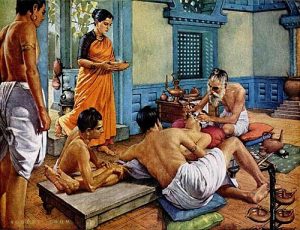
Ayurveda is referred to as ‘The science of life’, it is an ancient Indian system of natural and holistic medicines. While allopathic medicines tend to focus on the management of disease, Ayurved provides us with the knowledge of how to prevent disease and how to eliminate its root cause if it does occur.
According to Ayurveda, each person will be influenced by certain elements more than others, this is because of their prakruti or natural constitution. It categorizes the 3 different constituents into 3 different doshas- वात (vaat – air and space dominance),पित्त (pitta – fire), कफ (Kapha – earth and water).
Doshas not only affect the shape of one’s body but also bodily tendencies (food preferences and digestion), and the temperament of one’s mind and emotions.
Treatment in Ayurveda can grossly be divided into
शमन (shaman – palliative) and शोधन (shodhan – purificatory of detoxification) therapy.
Shaman includes दीपन (deepan – carminative), पाचन (pachan – digestive), and लंघन (langhan – fasting).Shodhana includes पंचकर्म-वमन (panchakarma – vaman – medicated-emesis), विरेचन (virechan-medicated purgation), बस्ती (basti –medicated enema), नस्य (nasya – nasal errhines) and रक्त मोक्षण (raktamokshana – bloodletting).
